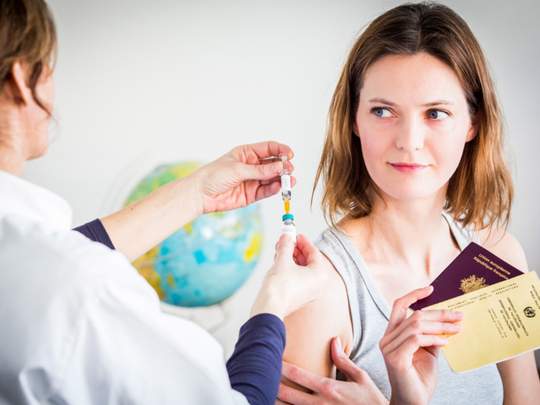
Abu Dhabi: Despite their role in providing protection against infectious diseases, there is a noticeably low uptake of optional travel vaccinations among UAE residents, doctors have said.
Most residents either get vaccinated at the last minute, or do not visit a doctor. However, this lack of awareness about the importance of travel vaccinations often proves costly for them, health professionals say.
“UAE residents travel a lot, but vaccines are often the last thing in their plans. What this means is that they run the risk of contracting preventable, infectious illnesses which may spoil their enjoyment, or lead to many sick days once they return,” Dr Rahul Goyal, family medicine consultant and head of primary care and emergency services at Al Noor Hospital, told Gulf News.
“In fact, I only find out that patients will be travelling if they casually mention it while visiting me with other health concerns. The ideal thing to do, however, is for residents to see a doctor at least a month or three weeks before they travel,” he added.
Travellers from the UAE often contract water and food-borne illnesses during their trips, including typhoid and hepatitis A, or malaria, which is transmitted by mosquitoes in certain tropical regions. Many also come down with the flu.
Children below the age of five, pregnant women, those over 65 years of age, and residents with chronic illnesses who take immunity-suppressing drugs, are most at risk of falling sick during their travels.
“These diseases are, however, largely preventable through a course of widely available vaccinations, and the cost is also not prohibitively high, especially when compared to the spiralling treatment costs after actually contracting these communicable illnesses,” said Dr Deepti Chaturvedi, paediatric specialist at Burjeel Hospital in Abu Dhabi.
For example, the vaccines against hepatitis A, which is endemic in African, Asian and Asia Pacific nations, is given in three doses, with the first two in the month before travelling, and the last administered six months afterwards. This provides five years of protection to a resident. Injections or oral drugs also help vaccinate against typhoid, but these must be taken at least a week before travelling, and renewed every two to three years.
For malaria, which is endemic in the tropics, South Asia and Africa, residents can start taking a daily pill before they leave, and continue taking it until after they return to the UAE.
“The majority of these vaccines cost about Dh200 to Dh300 per shot, but there is not enough awareness about the importance of these optional vaccines, even among parents of small children,” Dr Chaturvedi said.
The doctor added that it is even prudent for expatriates going back home to vaccinate their children because many do not have inherent immunity to infectious illnesses that are prevalent in their home countries.
The emirate of Abu Dhabi’s health sector regulator, the Health Authority Abu Dhabi (Haad), also runs an annual campaign with regular reminders for residents about the need to get travel vaccinations.
-With additional inputs by Omnia Fahim, Trainee at Gulf News
What residents say
Hossam Ahmad, a 33-year-old interpretation supervisor from Iraq, always checks on what diseases are endemic in the countries he travels to.
“I also find out how diseases are transmitted, and take the necessary precautions. For example, I took vaccinations against malaria and hepatitis A before visiting Malaysia recently, and also learnt about how to protect myself from mosquito bites. While I do not always visit a doctor if no travel vaccines are recommended, I do take along medications to treat the flu because I often come down with it while travelling. The minimal vaccination cost should also not be considered when looking at one’s health.”
Mohammad Al Garrad, 30-year-old medical interpreter from Syria, tends to read up on diseases that are endemic in his travel destinations, but prefers not to be vaccinated.
“I have even changed my destination in the past after finding out about certain prevalent infectious diseases. But I do not normally visit a doctor beforehand. In fact, before visiting Egypt, I was advised to get vaccines against hepatitis A and typhoid, but I didn’t actually take them. I simply steered clear of street food and drinks, and practised basic hygiene.”
Sami Al Dhaibani, a 23-year-old student from Yemen, prefers to find out from his contacts about their travel experiences.
“I don’t really do much research on my own about travel destinations. Instead, I consult people on what precautions I should take, especially about diseases that they contracted. If I do happen to fall ill, I simply resort to taking the prescribed medicines while travelling.”













